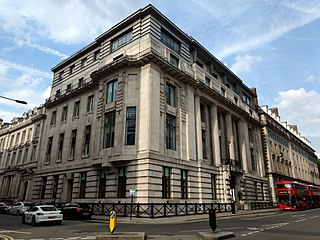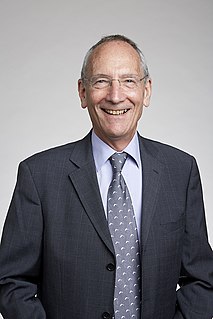Related Research Articles

The Royal Astronomical Society (RAS) is a learned society and charity that encourages and promotes the study of astronomy, solar-system science, geophysics and closely related branches of science. Its headquarters are in Burlington House, on Piccadilly in London. The society has over 4,000 members ("Fellows"), most of them professional researchers or postgraduate students. Around a quarter of Fellows live outside the UK.
The Council for British Archaeology (CBA) is an educational charity established in 1944 in the UK. It works to involve people in archaeology and to promote the appreciation and care of the historic environment for the benefit of present and future generations. It achieves this by promoting research, conservation and education, and by widening access to archaeology through effective communication and participation.
The Higher Education Funding Council for England (HEFCE) was a non-departmental public body in the United Kingdom, which was responsible for the distribution of funding for higher education to universities and further education colleges in England since 1992. It ceased to exist as of 1 April 2018, when its duties were divided between the newly created Office for Students and Research England.

The Royal Society of Medicine (RSM) is one of the United Kingdom's leading providers of continuing learning in healthcare. Its vision is 'better healthcare for better lives'. It aims to achieve this by sharing learning and supporting innovation on the science, practice and organisation of medicine, through four key pillars:
Neuroendocrinology is the branch of biology which studies the interaction between the nervous system and the endocrine system; i.e. how the brain regulates the hormonal activity in the body. The nervous and endocrine systems often act together in a process called neuroendocrine integration, to regulate the physiological processes of the human body. Neuroendocrinology arose from the recognition that the brain, especially the hypothalamus, controls secretion of pituitary gland hormones, and has subsequently expanded to investigate numerous interconnections of the endocrine and nervous systems.

The Psychonomic Society is one of the primary societies for general scientific experimental psychology in the United States. It is open to international researchers, and almost 40% of members are based outside of North America. Although open to all areas of experimental and cognitive psychology, its members typically study areas such as learning, memory, attention, motivation, perception, categorization, decision making, and psycholinguistics. Its name is taken from the word psychonomics, meaning "the science of the laws of the mind".
The Historical Association is a membership organisation of historians and scholars founded in 1906 and based in London. Its goals are to support "the study and enjoyment of history at all levels by creating an environment that promotes lifelong learning and provides for the evolving needs of people who share an interest in history." The association's patron is Queen Elizabeth II. The Historical Association was incorporated by royal charter in 2006, its centenary year. Legally it is a charity registered in England. The plan for a national historical association came from a group school teachers. The formation was handled by university academics, especially Charles Firth, Albert Pollard, and Thomas Tout. At first it dealt chiefly with teaching problems. The membership was expanded to include laymen, and the association branched out into activities such as publication and research in local history.

The Nautical Archaeology Society (NAS) is a charity registered in England and Wales and in Scotland and is a company limited by guarantee.
The Society of Chemical Industry (SCI) is a learned society set up in 1881 "to further the application of chemistry and related sciences for the public benefit".

Stafford Louis Lightman has been Professor of Medicine, University of Bristol, since 1993. He was president of the British Neuroscience Association 2017–2019.
The Journal of Neuroendocrinology, first published in 1989 is an academic journal that mainly publishes reports of original research in the field of neuroendocrinology, along with occasional review articles; it claims to provide “the principal international focus for the newest ideas in classical neuroendocrinology and its expanding interface with the regulation of behavioural, cognitive, developmental, degenerative and metabolic processes.”
The Design History Society is an arts history organisation founded in 1977 to promote and support the study and understanding of design history. The Society undertakes a range of charitable activities intended to encourage and support research and scholarship, to offer information and create networking opportunities, to foster student participation and public recognition of the subject, and to support regional links and events. The Society welcomes members from related disciplines such as anthropology, architecture and art history, business history, the history of science and technology, craft history, cultural studies, economic and social history, design and design management studies. An elected Executive Committee and Board of Trustees works to enable the activities of the Society, and to ensure that design history is appropriately represented in higher education and research bodies in the UK.
The Operational Research Society (ORS), also known as The OR Society, is an international learned society in the field of operational research (OR), with more than 3,100 members (2021). It has its headquarters in Birmingham, England.
The Nepal Mathematical Society (NMS), was founded (formally) in January, 1979, by enthusiastic Nepalese mathematicians of that time, with the aim of enhancing the academic excellency in studying, teaching, research and applications of Mathematics.
Founded in 1961, the American College of Neuropsychopharmacology (ACNP) is a professional organization of leading brain and behavior scientists. The principal functions of the College are research and education. Their goals in research are to offer investigators an opportunity for cross-disciplinary communication and to promote the application of various scientific disciplines to the study of the brain’s effect on behavior, with a focus on mental illness of all forms. Their educational goals are to encourage young scientists to enter research careers in neuropsychopharmacology and to develop and provide accurate information about behavioral disorders and their pharmacological treatment.
The British Society for Research on Ageing (BSRA) is a scientific society which promotes research to understand the causes and effects of the ageing process. The BSRA encourages publication and public understanding of ageing research and holds an annual scientific meeting. Many notable scientists with an interest in ageing are either past or current members of the organisation, which has exerted a marked influence on ageing research within the United Kingdom and internationally.

The British Academy of Management (BAM), founded in 1986, is a learned society dedicated to advancing the academic discipline of management in the United Kingdom. It is a member of the Academy of Social Sciences. The academy runs two peer-reviewed academic journals: the British Journal of Management and the International Journal of Management Reviews. The headquarters of the British Academy of Management is in London, United Kingdom.

Matthias H. Tschöp is a German physician and scientist. He is the chief executive officer and scientific director of Helmholtz Zentrum München, German Research Center for Environmental Health. He is also Alexander von Humboldt Professor and Chair of Metabolic Diseases at Technical University of Munich and serves as an adjunct professor at Yale University.
The British Pain Society (BPS) is a multidisciplinary community that brings together a diverse group of clinicians, nurses, physiotherapists, scientists, patients, and other professionals to improve the knowledge of pain, and implement new public policies and clinical practices to alleviate pain-related suffering. The society was founded in 1967. The BPS has a wide range of activities, from setting standards in clinical care, offering conferences, meetings, courses for special interest groups as well as publishing the British Journal of Pain. Patients are also actively involved with the work of the society.

Suzanne L Dickson is a neurobiologist and Professor of Neuroendocrinology in the Department of Physiology within the Institute of Neuroscience and Physiology at the Sahlgrenska Academy at the University of Gothenburg in Sweden. She graduated from the University of Edinburgh with a B.Sc. (honours) in Pharmacology. Her doctorate research was undertaken at the Babraham Institute with Professor Gareth Leng and she graduated with a Ph.D. in Neuroendocrinology from the University of Cambridge in 1993. She is also an Honorary Professor in the College of Medicine and Veterinary Medicine at the University of Edinburgh.
References
- 1 2 3 British Society for Neuroendocrinology homepage
- ↑ British Society for Neuroendocrinology, Charities Commission website
- ↑ Journal of Neuroendocrinology. Wiley Blackwell. 2013. ISSN 1365-2826.